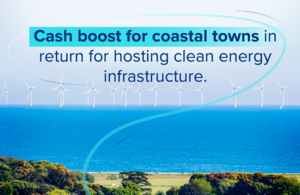Cash boost for coastal towns hosting clean energy infrastructure
Communities to receive funding for hosting clean energy infrastructure as part of plans to make Britain a clean energy superpower.

- Britain’s coastal and rural regions to receive a cash boost for hosting the infrastructure needed to make Britain a clean energy superpower
- communities hosting offshore wind and solar projects in line to receive money from energy developers, to be spent directly on local priorities and services such as community centres, sports facilities, and employment programmes
- cash boost to regional and local economic growth as part of the Plan for Change
Britain’s coastal and rural communities will receive a cash boost for new community facilities, better transport links and investment in apprenticeships, under government plans as part of the Plan for Change mission to make Britain a clean energy superpower.
The proposals will require community benefits for families, businesses and local community groups who live near offshore wind, onshore wind and solar farms.
They would enshrine in law a requirement for renewable developers to pay into community benefit funds, ensuring infrastructure projects contribute to residents’ lives, the local economy and growth as part of the government’s Plan for Change.
This could include new grassroots football pitches in Welsh seaside towns, initiatives to get young people into employment on the Yorkshire coast to train the next generation of engineers, and funding for transport links and schools in the Scottish highlands.
Coastal and rural areas will play a significant role in hosting the clean energy projects needed to get energy bills down for good and deliver energy security with homegrown power that Britain controls.
In recognition, the funding will channel community investment into where it has real impact – with families in the area deciding where the money should be spent. The plans also set out how communities could own a stake in renewable energy infrastructure through shared ownership, resulting in profits being reinvested back into the community and the British people having a stake in the clean energy transition.
The level of payments to communities will range depending on the size of infrastructure projects, from tens of thousands of pounds a year for small developments and up to millions of pounds per year for largescale developments.
Energy Secretary Ed Miliband said:
If you live near an offshore wind or solar farm, your local community should benefit from supporting this nationally critical mission.
The Prime Minister’s mission to become a clean energy superpower is creating good well-paid jobs in these areas, building the infrastructure we need to get energy bills down for working people.
Our Plan for Change will revitalise Britain’s coastal and rural communities creating community wealth, better facilities and energy security for the country.
This will benefit every household in the country by getting the UK off fossil fuel dependency and protecting billpayers from price shocks with clean homegrown power.
The announcement will build on measures introduced in the Planning and Infrastructure Bill where households within 500 metres of new or upgraded electricity transmission infrastructure will get electricity bill discounts of up to £2,500 over 10 years.
The proposals seek input on which types of energy infrastructure should be required to pay into community benefit funds, which may include renewable and low-carbon electricity generation, and energy storage.
Community benefits are an established part of development for energy infrastructure in many countries, including Ireland, France, Germany, Italy and Spain.
James Robottom, Head of Policy at RenewableUK, said:
Renewable energy developers have a long history of providing a wide range of benefits for local communities, such as community benefit funds which support local initiatives, electricity discounts, employment initiatives and environmental projects.
We welcome the government’s consultation and will engage with it to ensure that the benefits received by local communities hosting energy infrastructure are proportionate and continue to meet their needs. Renewable energy developers are good neighbours and remain committed to providing benefits at an appropriate level to enable local communities to thrive all over the country.
This builds on Monday’s announcement to support coastal communities with the £360 million Fishing and Coastal Growth Fund, the new SPS (sanitary and phytosanitary) agreement that will slash red tape for UK seafood exporters and businesses, and a new twelve-year fisheries access agreement with the EU securing long-term certainty for British fishing fleets.
The Fishing and Coastal Growth Fund will see investment in new technology and equipment to modernise Britain’s fishing fleet, deliver new training and skills to back the next generation of fishers and promote the seafood sector to export our high-quality produce across the world.
Notes to Editors
Read more about the working paper. We are inviting views from industry and stakeholders on the proposals until Wednesday 16 July.